Table of Contents
The biggest dilemma you ever have to go through as an online instructor once you decide to start creating elearning courses is which online course platform to choose.
Currently, many course creation platforms offer features similar to those found in learning management systems (LMSs), with the addition of ecommerce capabilities to market and sell online courses and store and distribute online content.
One of the most appealing options for newcomers is a free online course platform, which allows users to create and sell courses without upfront costs. These platforms provide valuable ways to test and develop courses, making it easier for beginners to enter the online education space.
So, if you are an aspiring course creator, educator, training provider, coach, or entrepreneur seeking to launch or expand your online courses and looking for the most suitable platform to host and sell your content, we’ve compiled this handy guide that lists our best online course platform picks.
Deciding which online course platform is the best for your needs might take some time, but it’s crucial to use that time wisely to review what each offers before you invest in one.
How to choose an online course platform
Apart from ease of use, comparing pricing, features, and customer support offered by online course platforms are crucial factors to consider when choosing a course creation tool to suit your preferences.
Here’s why.
Pricing
Pricing directly impacts the feasibility and sustainability of your educational venture. It can help determine whether a course platform aligns with your budget and long-term goals. Beyond the initial cost, you must also look for potential hidden additional fees or revenue-sharing models.
Core features
Look for an online class platform that offers a robust suite of features tailored to your instructional needs, such as multimedia integration, assessment tools, or interactive discussions.
A learning management system (LMS) can provide these features and more, including course building, student engagement, and customizable environments. Also, check if they have all the ecommerce features you need to sell courses, such as a checkout, landing page builder, integrations and email marketing tools.
A comprehensive feature set enhances the learning experience and empowers you to craft engaging and impactful educational content.
Customer support
Customer support can tell you a lot about user satisfaction. It allows you to evaluate the responsiveness, accessibility, and expertise of the platform’s support team, gauging their ability to address issues promptly and effectively.
Opt for the top online courses sites that offer a range of support channels, including live chat, email, or dedicated forums, fostering a collaborative ecosystem where challenges are met quickly.
💡Eager to find the perfect platform for your online courses? Discover how to choose the right elearning solution in this FREE expert webinar.
Different types of online course platforms
To fully understand what each platform offers, you need to become more familiar with the differences between online course platforms and the different types you may come across.
Online course creation platforms provide tools for building and selling courses, offering features like customization options, interactive tools, and marketing capabilities. There are standalone online platforms, course marketplaces, all-in-one platforms, and LMS WordPress plugins.
Standalone online course platforms
Standalone course platforms are hosted platforms that focus on providing specific tools or services rather than offering a comprehensive suite of features. These platforms may specialize in one aspect of the course creation process, such as course hosting, learning management, or content creation, without bundling functionalities like website building, marketing, or payment processing.
Online course creation software, on the other hand, provides a more integrated approach, offering features like customization options, user management, and sales tools, which cater to different user needs and goals.
Unlike course marketplaces, standalone online course platforms offer greater flexibility and control in managing your learning resources. You can choose the design and look of your business website—and course presentation, promote your courses, and enjoy the benefits of ongoing support.
These platforms are often preferred by creators who have specific functionality requirements or preferences for certain features. A huge advantage of standalone platforms is that you own the users’ data and can customize the branding.
LearnWorlds is the best standalone and all-in-one online course platform in the market that can offer exactly what you need. Get your 30-day free trial with LearnWorlds today.
Online course marketplaces
Course marketplaces are like supermarkets for courses. They offer a diverse range of courses from a variety of course creators.
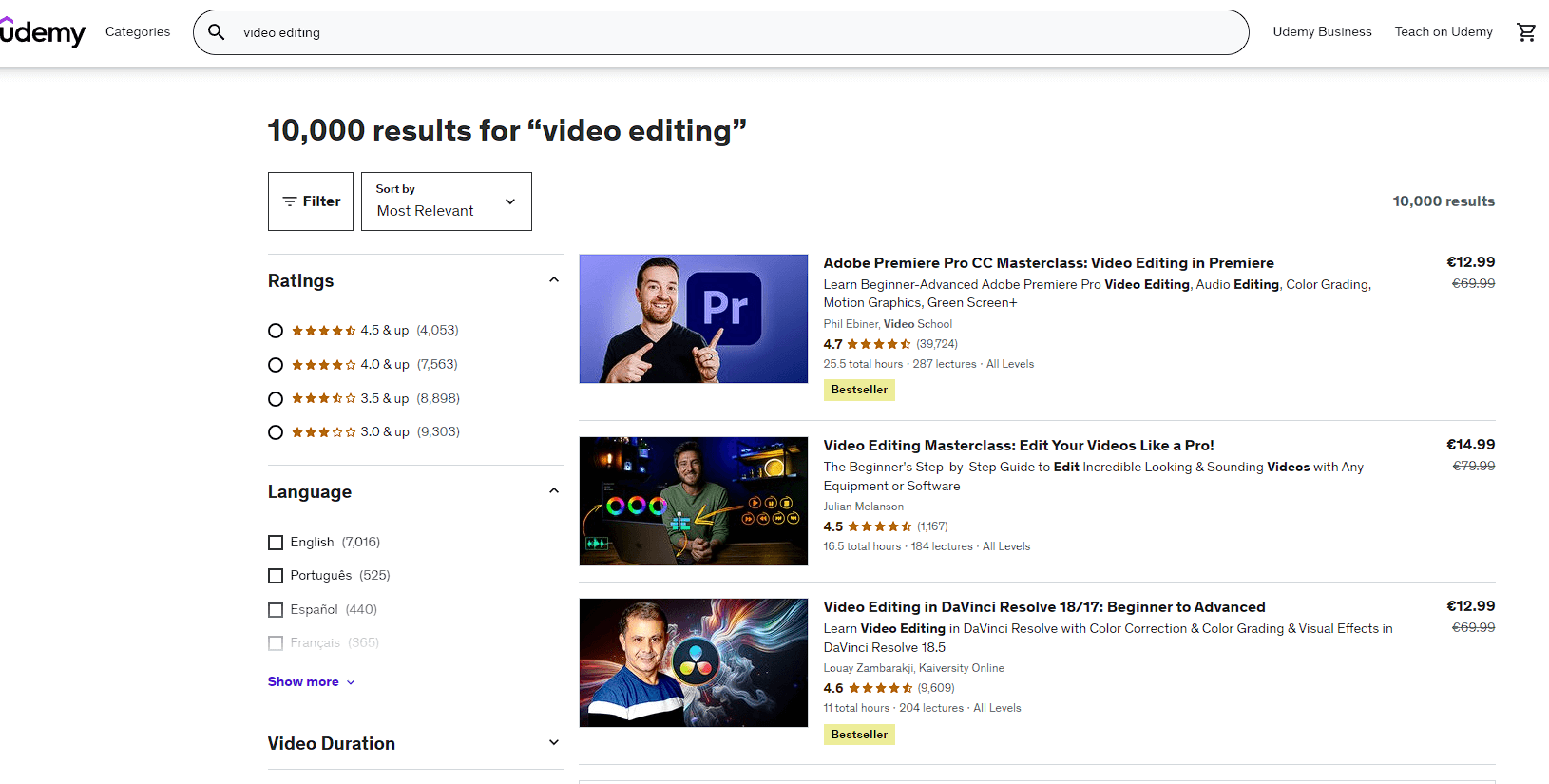
On the one hand, marketplaces take much of the work of creating a website yourself and hosting the courses, but, on the other hand, you lose control of student data and a huge chunk of the income.
Often the perception is that course marketplaces will sell the courses for you, which is not true. There is a lot of competition in course marketplaces, and you will need to work a lot on your own marketing to be successful, as much as if you were using another solution.
However, these websites already have a large number of users, and if you are not planning to invest in your own brand and website, they can be ideal.
All-in-one online course platforms
All-in-one course platforms provide everything a creator needs to develop, host, market, and sell online courses without requiring additional third-party tools. These platforms, often referred to as online course software, focus on marketing and business-building features, making them the ultimate tool for edupreneurs.

These platforms often include features such as course creation tools, website builders, content management systems, marketing automation tools, payment processing, analytics, and sometimes even student engagement tools like discussion forums or community features.
The goal of all-in-one platforms is to streamline the course creation process and provide a cohesive ecosystem for managing your entire elearning business from a single platform. Like standalone platforms, you have full control over your users’ data and additional customization in branding.
LearnWorlds is the best standalone and all-in-one online course platform in the market that can offer exactly what you need. Get your 30-day free trial with LearnWorlds today.
WordPress plugins for online courses
If you have a WordPress website and want to deliver online learning, you can either use a standalone platform that is on a subdomain of your WordPress site or a WordPress plugin.
An online course plugin for WordPress allows you to host courses on your website. Each WordPress plugin offers a different set of possibilities and is either free or paid. With it, you can easily start selling courses without having much technical knowledge.
A word of caution here: combining too many plugins may cause crashes. You must also be aware of the hidden costs associated with this option. While a plugin is cheaper than other solutions, it means you need to host the content and videos yourself, which might add up to a decent cost as you move on.
Comparing the best platforms for online courses
Equipped with this crucial information, let’s go over the top online course platforms in the market, looking into their offerings and pros and cons in more detail.
This online course platform comparison can help you choose the best fit for your goals.
Platform #1: LearnWorlds
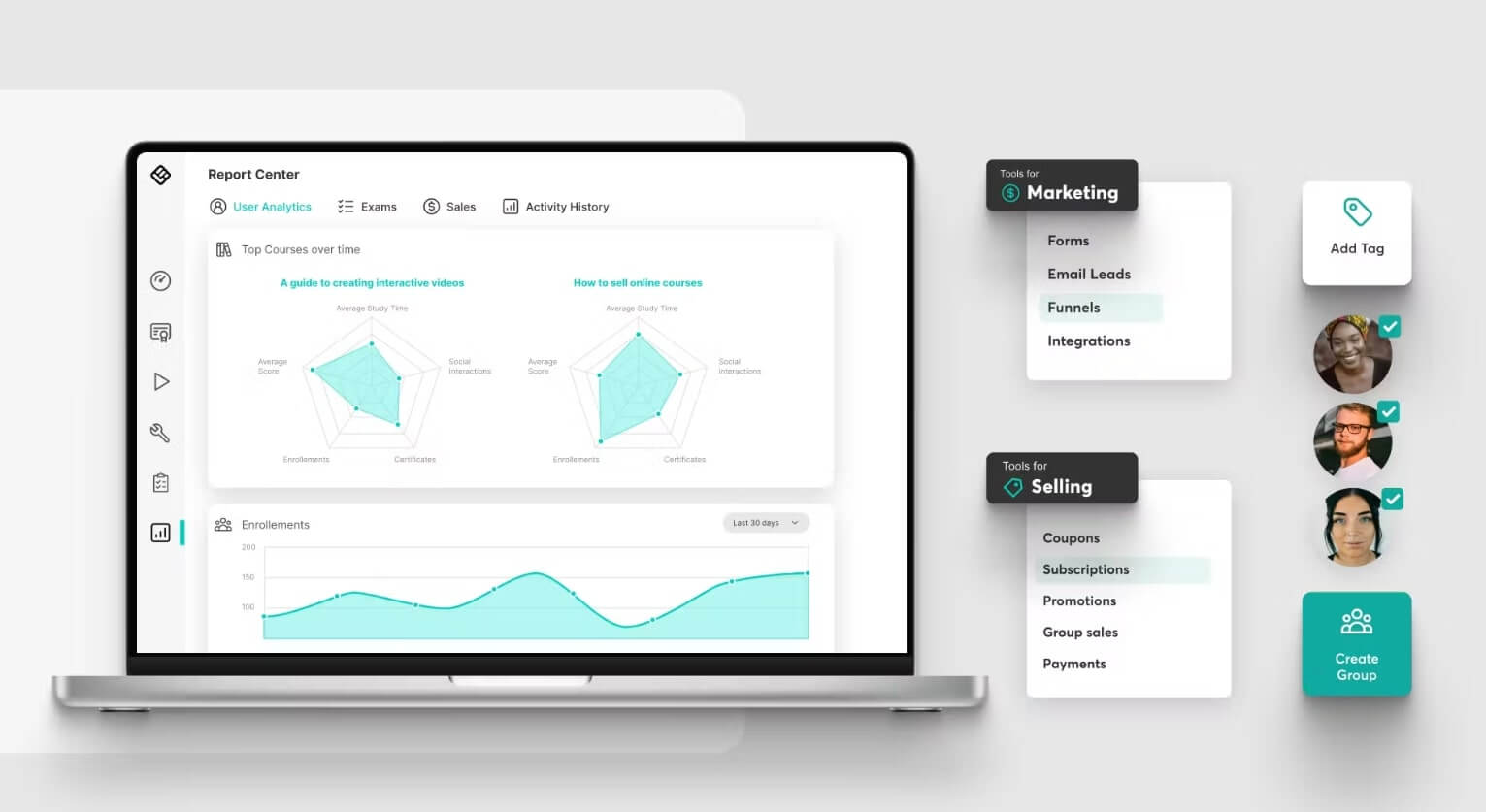
LearnWorlds is a premium AI-powered all-in-one online course platform that helps you build your online academy from scratch and sell online courses. Its intuitive course builder and AI Creator make building engaging elearning content a super-easy and quick process.
This online course platform offers video interactivity, real-time and in-depth analytics, powerful assessment tools, a mobile app builder, and an intuitive no-code website builder with robust customization—50+ fully customizable templates, branding abilities, robust built-in community features, and many more.
Best for
LearnWorlds is ideal for entrepreneurs, instructors, digital creators, educators, coaches, professional trainers, and businesses that want to sell their knowledge or train their employees, customers, or partners.
LearnWorlds pricing
LearnWorlds offers a 30-day free trial, and its paid plans include:
All these plans include unlimited courses, providing great value for users looking to create comprehensive online courses without restrictions on the number of paid offerings.
Information retrieved from LearnWorlds’s pricing page in August 2025.
LearnWorlds support
LearnWorlds offers responsive 24/7 online support with onboarding for new customers. On top of that, it features the LearnWorlds Academy that offers courses to course creators, free elearning resources – ebooks and checklists, and a support desk with how-to guides and tutorials.
Pros & cons
Pros
- Easy-to-use platform and user-friendly UI
- Built-in course authoring with advanced learning features
- Marketing & sales features like payment gateways, email marketing, funnels, etc.
- White-label mobile app
- Social logins – option to sign up with social media
- Supports SCORM and HTML5 files
- AI Assistant course creation
- Exceptional customer support
Cons
- No free plan
- Does not support TinCan and xAPI
- Limited gamification options
Customer verified review on G2
“LearnWorlds is versatile, feature-packed, and incredible!” – David’s review on G2
What do you like best about LearnWorlds?
LearnWorlds offers absolutely everything that we could ask for in terms of an online learning platform, from content offerings to data reports, and user access to integration opportunities, it has it all! Most importantly, though, the support that we receive from everyone that we have reached out to at LearnWorlds has impressed us every single time.
We are a company that came to LearnWorlds with very unique set of needs, but they said, “No problem!” at every item, idea, and request that we came up with in our conversations.
What do you dislike about LearnWorlds?
We have been on the LearnWorlds platform for a year, and we have not found anything that we dislike at this point.
What problems is LearnWorlds solving and how is that benefiting you?
LearnWorlds is filling a void that has existed in our company for the last few years; we needed a robust, feature-packed learning platform for our employees and for customer-facing courses. The switch to the LearnWorlds platform has not only filled the void, but it has created new opportunities for our company and for our users.
David W., Professional Learning Designer, Online Learning
Platform #2: Thinkific
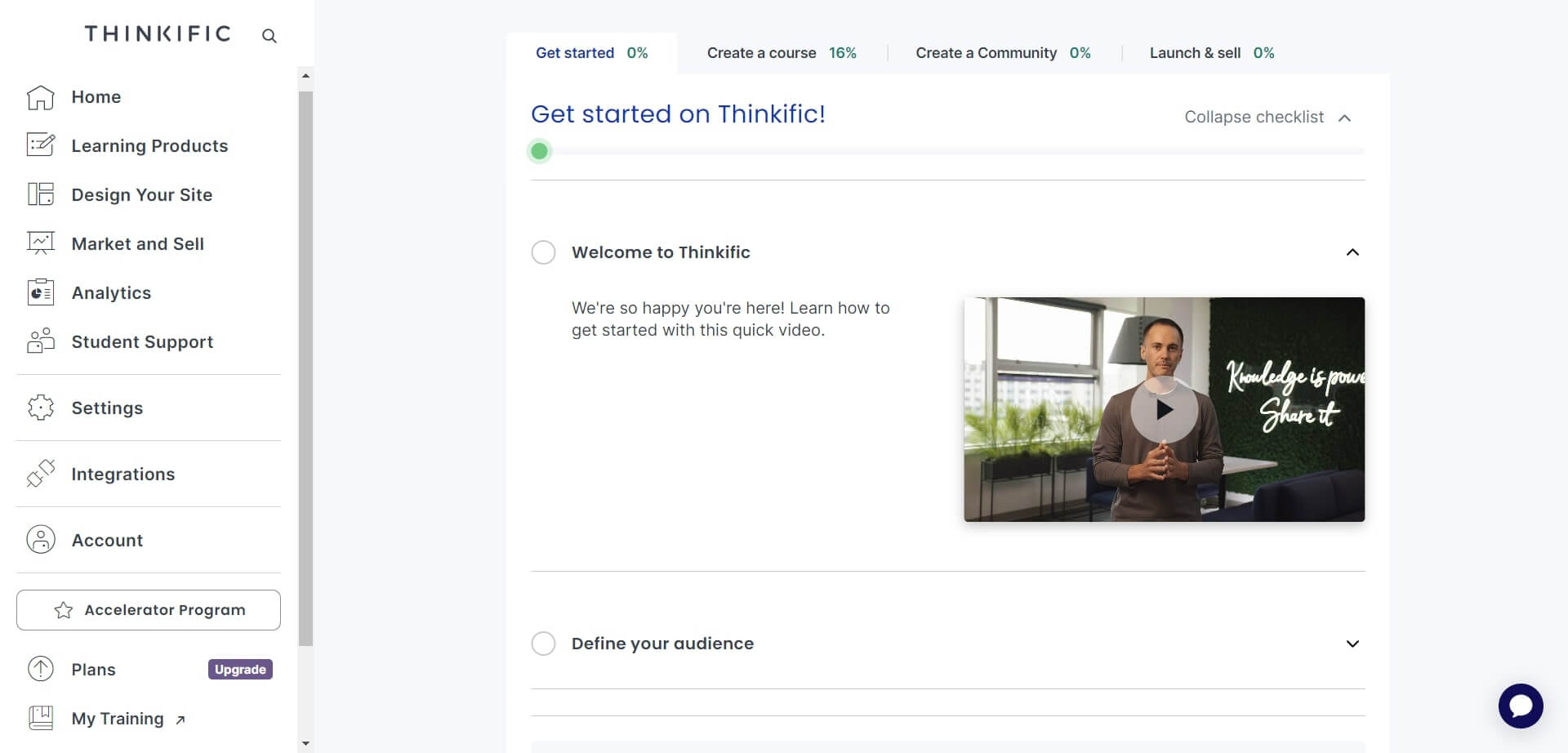
Thinkific is a standalone online course platform that helps you create and sell courses by providing a professional and user-friendly setup for designing course pages and promoting courses effectively.
As one of the most popular course creation software, it provides everything you need to build your online education business, including an easy-to-use interface to create course content and rich multimedia elements, such as videos, quizzes, and discussions.
The platform also allows you to create custom websites, landing pages, and sales pages and offers seamless integration with payment gateways. With its analytics and reporting features, you can track student progress, course engagement, and sales performance, enabling data-driven decisions to optimize both your content and marketing strategies.
Best for
Thinkific is ideal for solopreneurs, small/medium businesses – SMEs, and online trainers.
Thinkific Pricing
The platform has a free 14-day trial free plan. Subscription plans include:
*Information retrieved from Thinkific’s pricing page in December 2025.
Thinkific support
Thinkific has a help support center with articles and tutorials, a training site with paid courses, an FAQ, a blog, and a lively community. It also offers the possibility of hiring an expert to help you with the course creation and development process.
Pros & cons
Pros
- It features a landing page builder
- It offers built-in sales and marketing tools
- It has multiple integrations, including Zapier
- It has 24/7 support
Cons
- It offers limited control over website design
- It can be difficult to build complex courses
- It does not support SCORM, TinCan, or AICC
- It doesn’t include social features
- It focuses more on sales features rather than learning
💁 Compare Thinkific with LearnWorlds
💁 Kajabi vs Thinkific: A Side-by-Side Comparison
Platform #3: Teachable
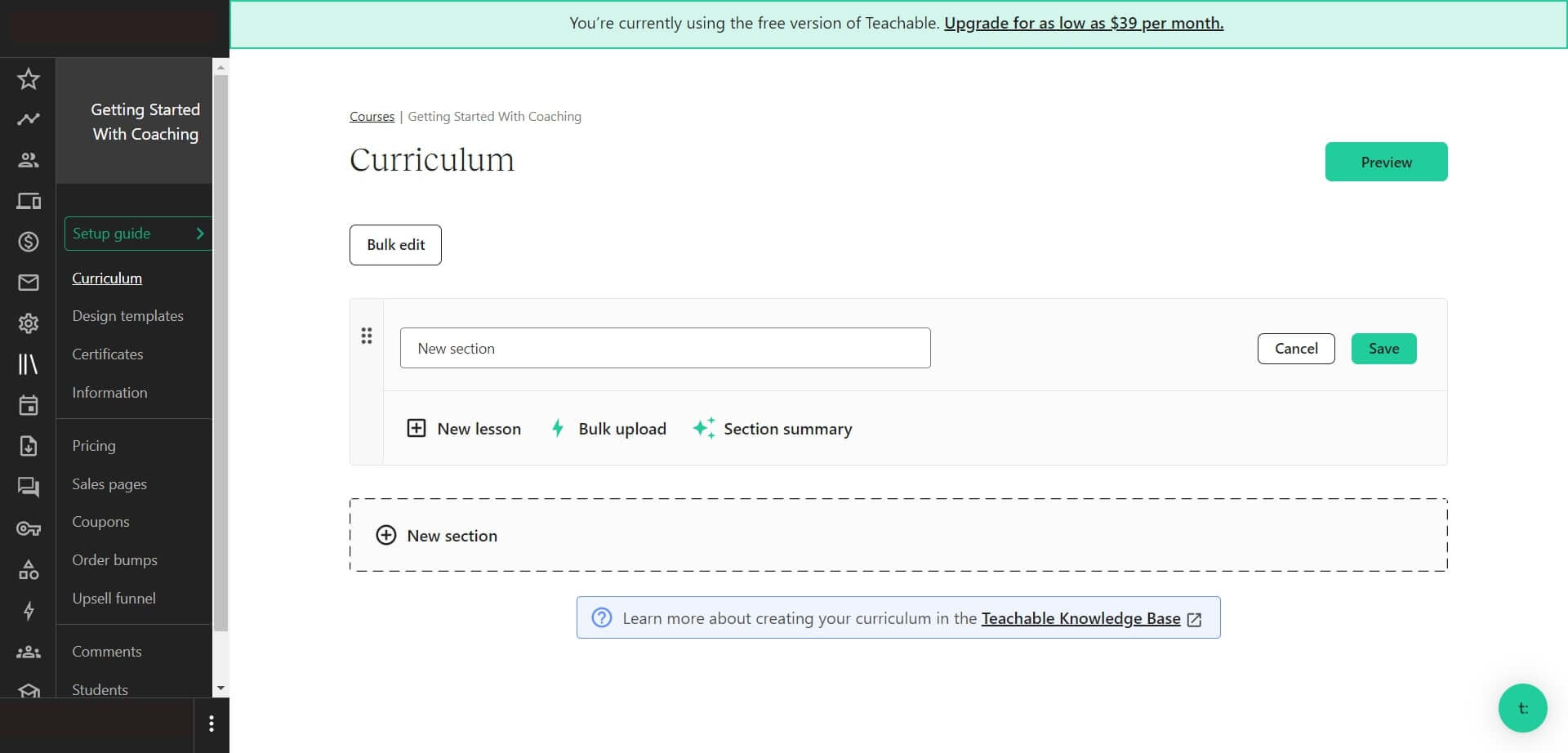
Teachable is one of the best online course platforms designed to create and sell courses with ease. It offers a user-friendly interface that allows course creators to upload content, design engaging lessons, and customize their own branded online school without the need for technical expertise.
From video lectures and quizzes to downloadable resources and assignments, Teachable provides a comprehensive set of tools to create a robust learning experience. Its drag-and-drop editor and customizable templates make it easy for users to personalize their school’s look and feel, ensuring their brand stands out. Course creators can also leverage features like sales pages, coupon codes, and affiliate programs to expand their reach and increase revenue.
Best for
It’s a great option for new course creators, solopreneurs, coaches, and creative professionals.
Teachable Pricing
Teachable does not offer a free plan, but it has a 7-day free trial. Also, it offers the following paid plans:
*Pricing information retrieved from Teachable in December 2025.
Teachable support
Teachable has a knowledge base with how-to guides and tutorials that can help you get started. It also features a blog and podcasts.
Pros & cons
Pros
- It has a simple and easy-to-use interface
- It has a landing page editor and blogging capabilities
- It comes with built-in ecommerce features
- It includes a built-in email marketing tool
- It offers a mobile app that is common to all schools
Cons
- Its learning/teaching and assessment capabilities are limited
- It does not support advanced learning activities
- Its customer support is not very responsive
💁 Compare Teachable with LearnWorlds
💁 Compare Teachable with Kajabi
Platform #4: Kajabi
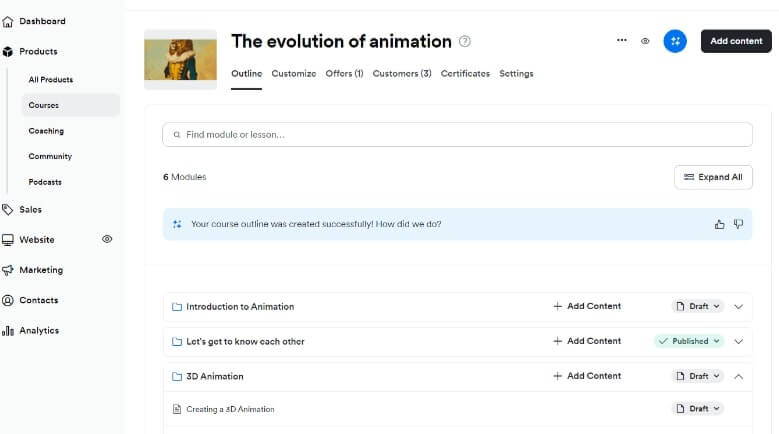
As another all-in-one online course platform, Kajabi offers several tools to sell digital products, including online courses, membership sites, and coaching programs. Kajabi is strong in its marketing features and specializes in building high-converting funnels, sales pages, landing pages, and webinar pages, as well as launching effective advertising campaigns.
The platform also includes powerful email marketing automation, allowing you to nurture leads and engage students with personalized email sequences. Kajabi’s analytics and reporting features provide valuable insights into student progress, sales performance, and marketing effectiveness.
Best for
It is for non-techy online course creators, digital entrepreneurs, small businesses, freelancers, creators, and individual instructors selling simple format courses and downloadables.
Kajabi pricing
Offers a 14-day trial. Then it goes to yearly or monthly payments, which include the following paid plans:
*Pricing information retrieved from Kajabi in December 2025.
Kajabi support
Kajabi’s support is offered during business hours and online. It has a Help Center that can answer most of your questions and a Kajabi glossary. There, you will find FAQs, how-to guides, walk-through videos, and getting-started resources.
Pros & cons
Pros
- It offers a 14-day trial
- It comes with built-in email marketing automation
- It provides sales pipelines/funnels building capabilities
- It allows the creation of course websites
- It features upsells, customized checkouts, and blogging functionality
Cons
- It can be tricky to set up
- It has expensive pricing options
- Additional transaction fees may apply on newer plans, especially when using third-party payment providers instead of Kajabi Payments
- It offers limited control over website design
- It doesn’t offer many learning features and focuses more on small digital product sales
💁 Compare Kajabi with LearnWorlds
Platform #5: LearnDash
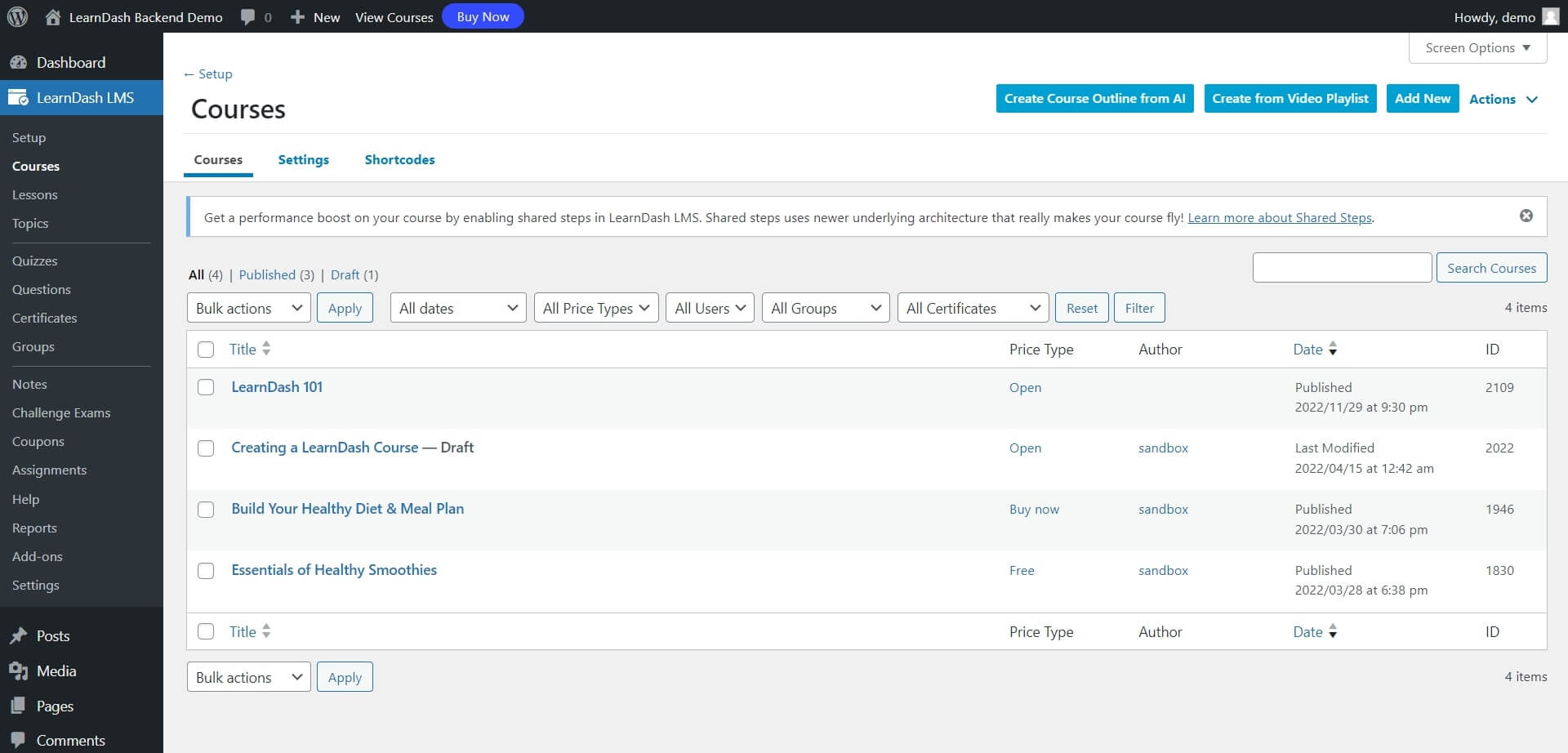
LearnDash is one of the most popular premium WordPress LMS plugins on the market. It allows you to easily design, promote, and sell online courses. One of the best features it offers is its speed and drag-and-drop course builder, which makes course creation enjoyable.
The platform integrates seamlessly with WordPress, providing a highly customizable learning experience. The plugin supports advanced features such as drip content, dynamic course prerequisites, and gamification elements like badges and certificates, which can enhance learner engagement and motivation.
Best for
It can be used by companies of all sizes, enterprises, and educational institutions, including universities.
LearnDash pricing
There are two ways to use LearnDash – either by getting the plugin or by launching a fully hosted course website.
LearnDash plugin’s pricing is based on the number of site licenses, and its paid plans are yearly only:
While LearnDash Cloud (full-site) comes in monthly and yearly subscriptions:
*Pricing information retrieved from LearnDash in December 2025.
LearnDash support
LearnDash support is available during business hours. Out of those hours, you can browse their knowledge base to find helpful guides and articles.
Pros & cons
Pros
- It has a free trial
- It has an automated mailing system that can send notifications
- It offers course completion certificates and achievement badges
- It supports PayPal, Stripe, WooCommerce, and Authorize.net
- It provides the possibility to integrate with marketing tools including MailChimp, WooCommerce, and WPForms
Cons
- It can get expensive as you get more add-ons to it
- It is not SCORM-compliant
- It doesn’t have any video conferencing tools
💁 LearnWorlds is the perfect LearnDash alternative for non-technical users.
Platform #6: LifterLMS
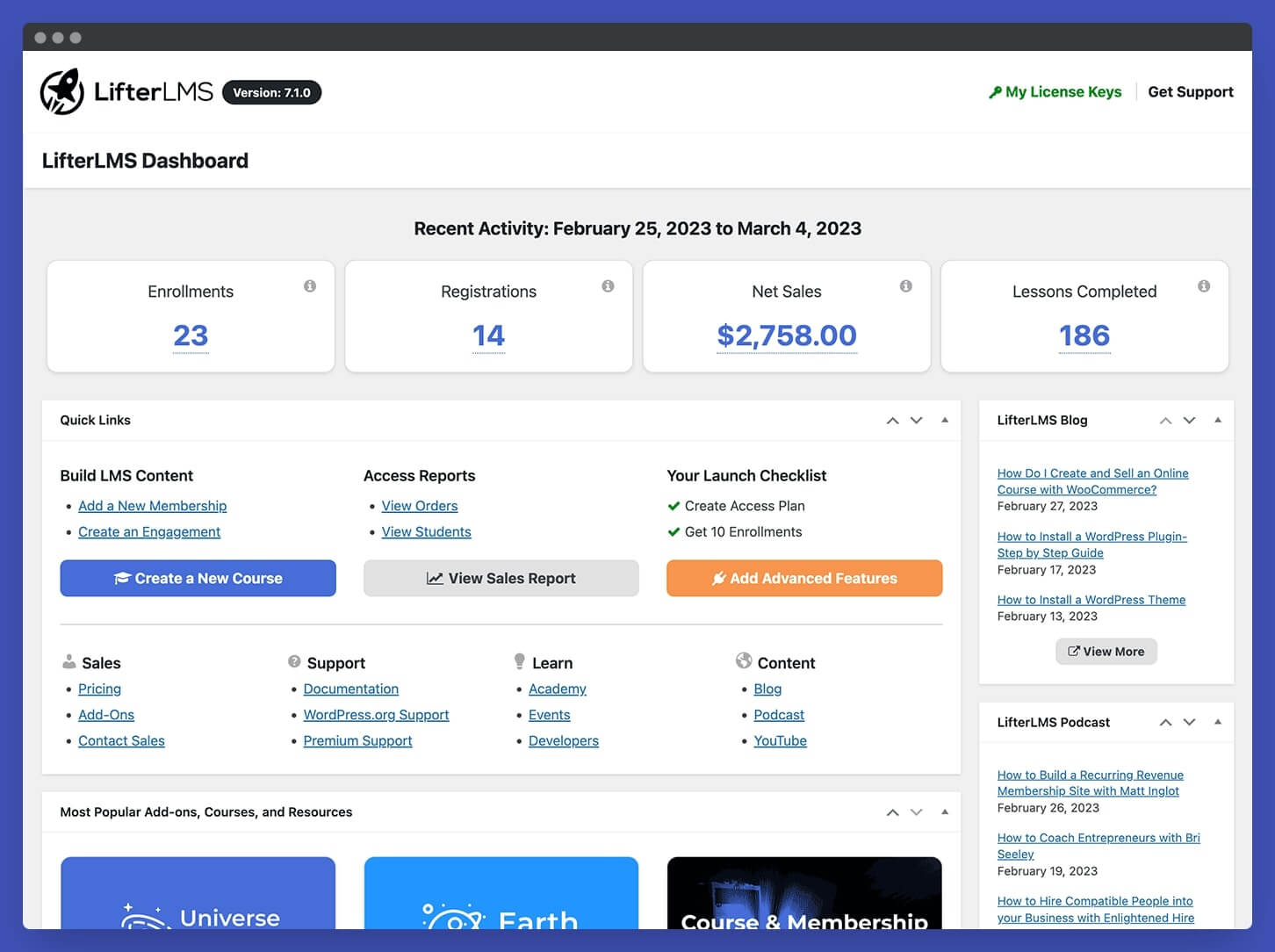
LifterLMS comes with helpful content management tools for offering individual courses, training-based membership websites, and MOOCs. As a free, open-source plugin, it allows you to build an LMS that can be enriched with add-ons that meet the unique needs of individuals, small groups, and niche markets.
Best for
It can be used by small-medium businesses, training organizations, or educational institutions.
LifterLMS pricing
LifterLMS has three subscription packages:
*Pricing information retrieved from LifterLMS in December 2025.
LifterLMS support
If you need help while using LifterLMS submit a ticket and expect to get an answer within 12 hours. As a free user, you can seek assistance in the community forums.
Pros & cons
Pros
- It has a free trial
- It has an automated mailing system
- It offers course completion certificates and achievement badges
- It supports PayPal, Stripe, WooCommerce, and Authorize.net
- It provides the possibility to integrate with marketing tools including MailChimp, WooCommerce, and WPForms
Cons
- It can get expensive as you get more add-ons to it
- It is not SCORM-compliant
- It doesn’t have any video conferencing tools
Platform #7: Udemy
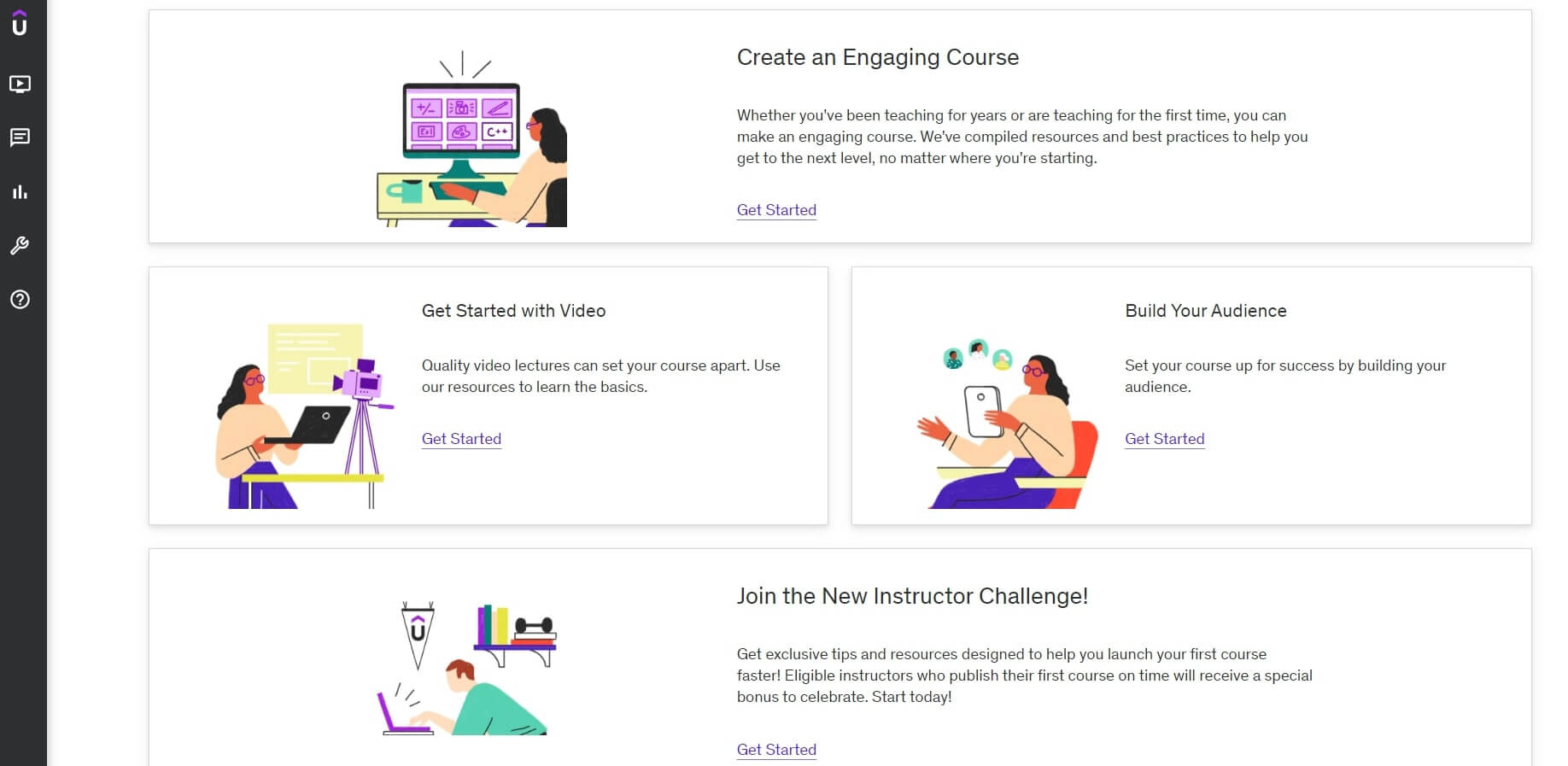
Udemy is one of the world’s most popular and largest online course marketplaces with 262K courses and over 883M enrollments according to The Report, offering courses in various subjects ranging from web and game development to entrepreneurship and finance.
Udemy delivers a unique learning experience and makes course creation possible for everyone. In doing so, it supports a range of online learning materials, including PDF documents, PowerPoint, text, and video content, among many others.
Best for
It is great for course instructors who are just starting or don’t have an existing email list, and want to see how the elearning industry works.
Udemy pricing
To start charging students a fee for courses on Udemy, you will need to become a premium instructor. In this case, the following conditions apply:
*Pricing adjusted on a global price tier matrix developed by Udemy.
**Pricing information retrieved from Udemy Support in August 2025.
Udemy support
Udemy’s Help Center offers support to instructors and students. Support for Business offers specific help and advice to users, admins, and instructors.
Pros & cons
Pros
- It has a user-friendly interface
- There is no setup cost
- It is geared towards self-paced learning and video courses
- There is no need for highly technical knowledge
- There is an Udemy app (available for iOS and Android)
Cons
- There is very limited interaction with students
- There is high competition between course creators
- There is no possibility of personal branding
- It controls prices and often sells courses for incredibly low prices
- There is no data ownership or control over branding – it keeps emails, and user data and does not share this information with its instructors
💁 Find out how Udemy compares to other course marketplaces like Skillshare.
Platform #8: Coursera

Coursera is one of the top online course platforms with over 129 million registered users, dedicated to delivering high-quality training and educational opportunities on a global scale. By partnering with top-tier universities and industry-leading companies, Coursera offers learners access to a diverse range of courses, from professional certifications to advanced degrees.
Through its extensive catalog, users can earn certificates from prestigious institutions in fields such as data science, business, digital marketing, and social sciences. Additionally, Coursera provides options for pursuing online degrees and specialized programs, empowering learners to advance their careers and gain valuable skills recognized by employers worldwide.
While partnering with world-class universities and businesses, it provides learners the opportunity to receive certifications from renowned institutions upon joining their paid courses or earn online degrees in selected subjects like data science, business, digital marketing, social sciences, and more.
Best for
It is aimed at professors who work or are based at an HE partner institution, industry professionals, and renowned businesses and enterprises.
Coursera pricing
Coursera offers free courses, subscriptions, and one-off payments depending on the course or program. It comes with two subscription plans:
The platform is free to instructors. Coursera partners who are selected to teach on the platform are paid through royalties or revenue sharing, grants, fixed payments, contracts, or affiliation agreements.
*Pricing information retrieved from Coursera in December 2025.
Coursera support
Coursera offers a range of help articles that can support you throughout your journey.
For additional help, you can contact the Coursera team mainly through email or a contact form. Depending on what type of user you are, eg university or industry partner or business, and the nature of the inquiry you have, you are encouraged to contact them in a specific way.
Pros & cons
Pros
- It offers a variety of learning options and activities
- It awards students with different types of certificates and degrees
- It offers high-quality educational tools and instructor interactions. (for instructors)
Cons
- It is limited to educators in partner institutions. (for instructors)
- Its course creation options are less flexible compared to other platforms. (for instructors)
Platform #9: LinkedIn Learning

LinkedIn Learning is an online education platform that offers a wide range of professional development courses and training programs by industry experts covering various topics such as business, technology, creative skills, and personal development. It is integrated with LinkedIn, allowing users to enhance their skills and add new credentials directly to their LinkedIn profiles.
The platform supports various learning formats and offers features like quizzes, assignments, and certificates to enhance the learning experience. Its goal is to provide learners with practical, job-relevant knowledge to help them advance their careers and improve their professional skills.
Best for
LinkedIn Learning is ideal for course creators who want to leverage a well-established platform with a built-in audience to deliver high-quality educational content.
LinkedIn Learning pricing
For course creators and instructors, LinkedIn Learning does not charge a fee to produce or publish courses.
Instead, LinkedIn Learning follows a revenue-sharing model with selected instructors, and the company compensates instructors for their work.
LinkedIn support
LinkedIn Learning provides support through various channels, including a comprehensive help center with FAQs, troubleshooting guides, and tutorials.
Users can also access support through LinkedIn’s customer service for account-related issues or technical problems. Additionally, LinkedIn Learning offers email support and community forums where users can ask questions and share experiences.
Pros & cons
Pros
- Large professional audience
- No production costs
- Upfront payment and royalties (long-term revenue stream)
- High-quality standards on elearning content
- Course creation support
Cons
- Very selective process
- No control over course pricing and access
- No direct relationship with learners
- Limited creative freedom because of strict guidelines
- Royalties based on engagement (minutes watched only)
Platform #10: Kartra
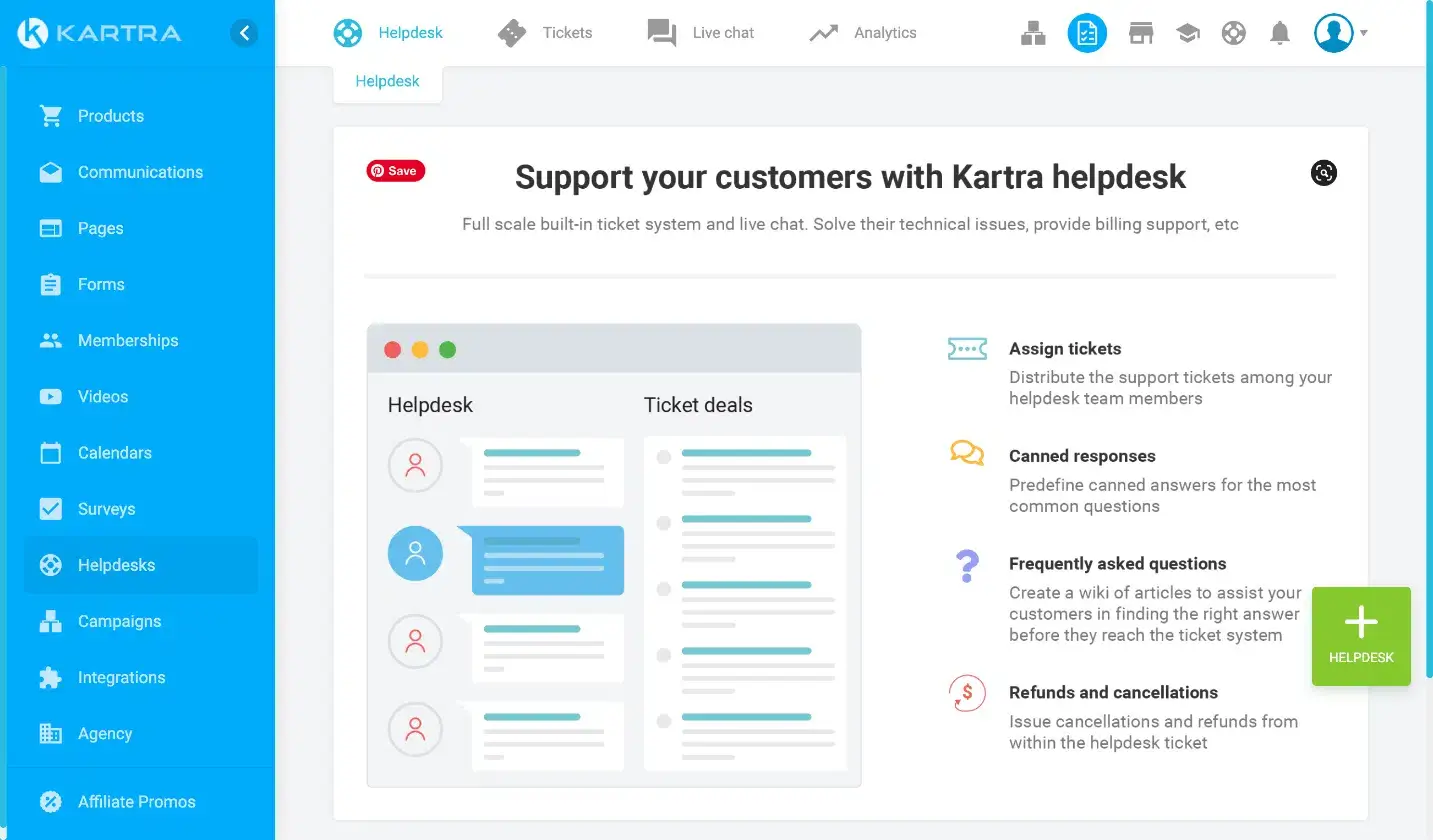
Kartra is a fully integrated marketing suite designed to help digital entrepreneurs build and scale their businesses. While not built exclusively for online education, many course creators use Kartra for its powerful sales funnels, automation features, and customizable membership portals. It’s a flexible choice for users who want to manage their entire online business—from content delivery to email marketing—all in one place.
As a contender among the top online course platforms, Kartra stands out for its marketing capabilities rather than its course-specific features. It’s particularly suited for entrepreneurs who prioritize customer acquisition and automation over traditional elearning tools.
Best for
Kartra is ideal for solopreneurs, digital marketers, and small businesses that want to create and sell online courses within a broader business ecosystem.
Kartra pricing
Kartra offers tiered pricing based on contact volume and features. There is no free plan, but all paid plans include core features like page builders, sales funnels, membership sites, and email automation.
All plans are billed monthly, with discounts available for annual subscriptions.
*Pricing information retrieved from Kartra in August 2025.
Kartra support
Kartra offers standard support through its Helpdesk, including live chat (for higher-tier plans), ticket-based support, and a comprehensive knowledge base.
Pros & cons
Pros
- Strong marketing and automation tools
- Built-in sales funnels and checkout features
- Includes email, SMS, and lead tracking
- Customizable membership portals
Cons
- Not built specifically for education or elearning
- Steeper learning curve for non-marketers
- No free trial or free plan
- Limited native course creation and assessment tools
Platform #11: Podia
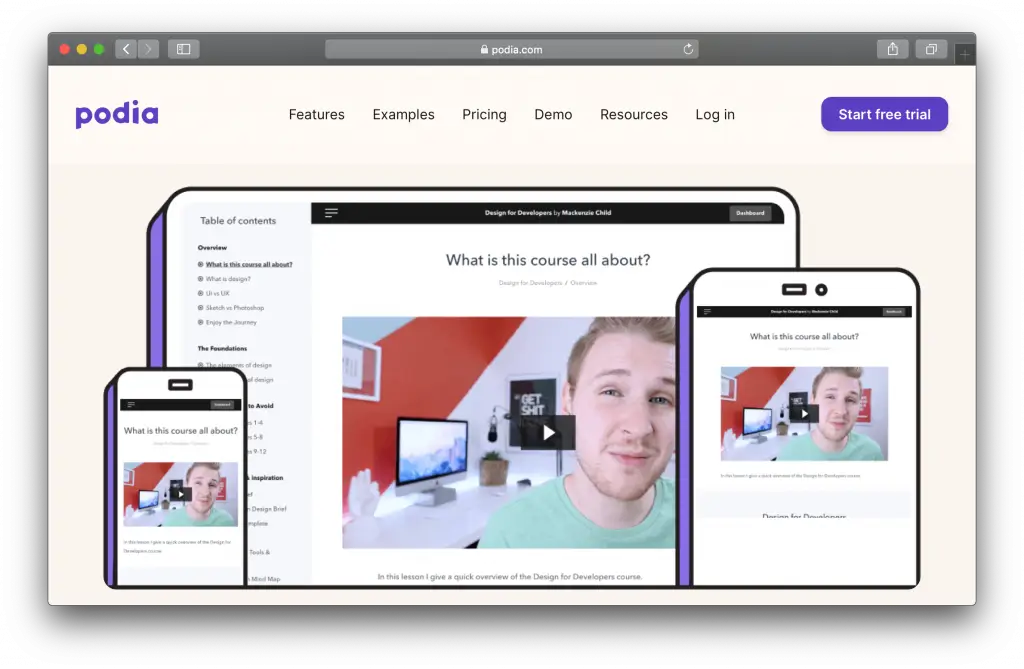
Podia is an accessible and creator-focused online course platform designed to help educators, coaches, and digital entrepreneurs monetize their knowledge with minimal friction. Known for its user-friendly interface, Podia allows users to sell online courses, digital downloads, memberships, and coaching services—all under one dashboard.
While it may not have the depth of features found in more advanced learning management systems, Podia remains a strong choice among the best online course platforms for creators who want simplicity and integrated tools without needing third-party plugins or tech support.
Best for
Podia is ideal for solopreneurs, new course creators, and small business owners looking for a straightforward way to sell digital products and courses.
Platform pricing
Podia offers a 30-day free trial with full access to its features, followed by two straightforward paid plans:
Both plans include Podia Email, with free email marketing for up to 100 subscribers.
*Pricing information retrieved from Podia’s website in August 2025.
Podia support
Podia provides 7-day-a-week support via live chat and email for all users. There’s also a knowledge base, video tutorials, and Podia University with resources to help users grow their business and make the most of the platform’s features.
Pros & cons
Pros
- Clean, beginner-friendly interface
- No technical setup required
- Integrated email marketing and digital product tools
- Affordable pricing and free trial available
Cons
- Limited customization and advanced learning features
- No built-in certificate generation
- No SCORM or quiz branching support
- Basic assessment tools
Platform #12: Skillshare
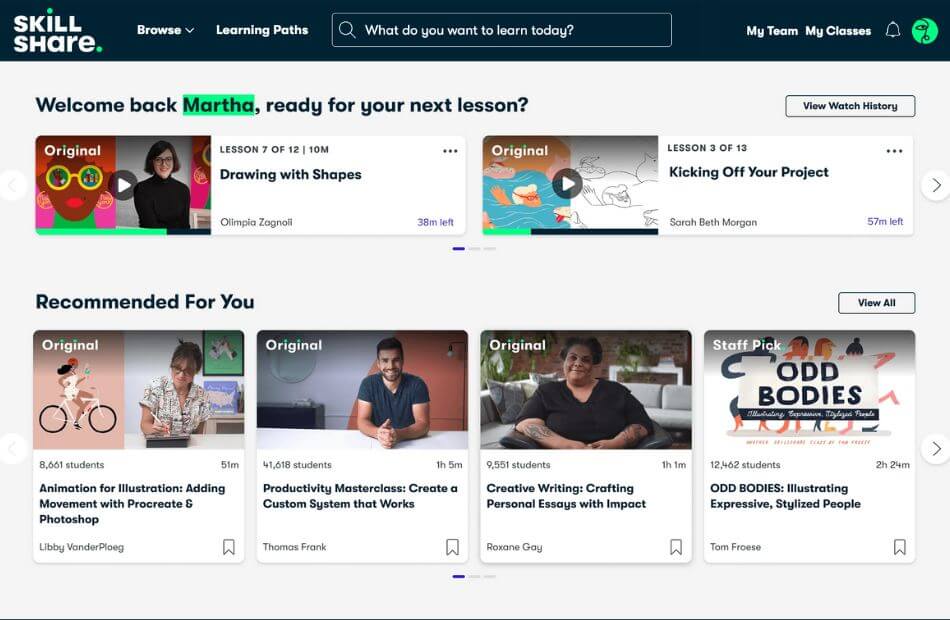
Skillshare is one of the most recognizable names among online course marketplaces. Unlike traditional course creation software, it operates as a subscription-based learning platform where instructors upload pre-recorded video lessons and students gain access to thousands of classes through one membership.
As one of the top online course sites, Skillshare appeals to aspiring educators who want to grow an audience without having to build their own site or manage ecommerce logistics. However, instructors are paid based on watch time and student engagement, so success depends heavily on visibility and video quality.
Best for
Skillshare is best suited for creative professionals, hobbyists, and entrepreneurs who want to reach a built-in audience. It’s also a popular online class platform for those just entering the world of teaching and content monetization, thanks to its low barrier to entry and streamlined course publishing process.
Skillshare pricing
Skillshare offers an annual subscription for learners at:
There is no cost for instructors to publish on Skillshare, but earnings are distributed based on minutes watched by Premium members. Instructors can also earn bonuses for referrals.
*Pricing information retrieved from Skillshare’s website in August 2025.
Skillshare support
Skillshare provides support through a detailed Help Center and email-based ticketing system. Instructor-specific resources include teaching guides, community forums, and video production tips.
Pros & cons
Pros
- Access to a large, engaged learner community
- No upfront costs for instructors
- Simple class creation and upload process
- Strong visibility for popular creative categories
Cons
- Revenue is based on engagement, not course sales
- Limited control over pricing and student data
- No direct student-teacher interaction tools
- Narrow focus—less ideal for technical or corporate training
Platform #13: Skilljar
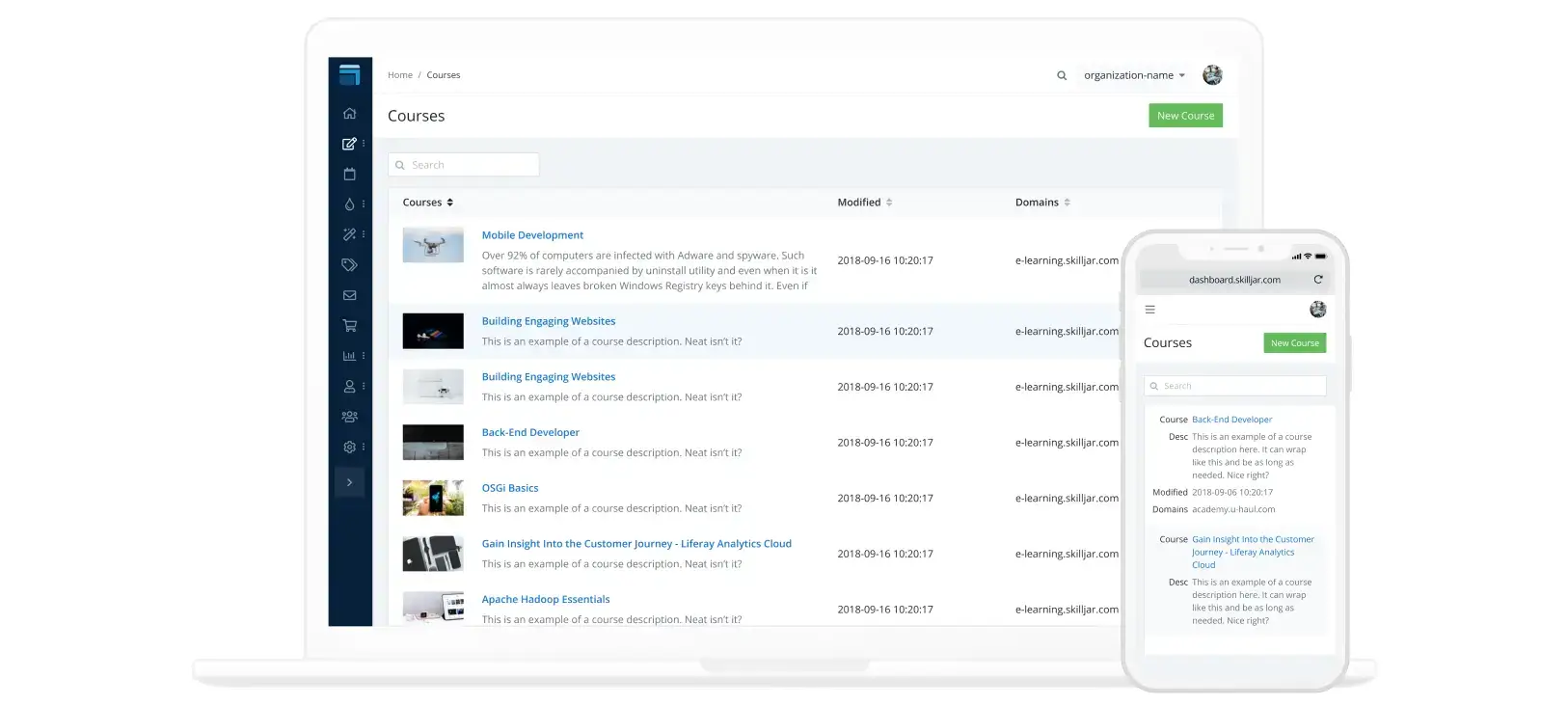
Skilljar is an enterprise-focused online course platform tailored to businesses that need scalable customer training.
As one of the best online course platforms for corporate use, it offers a robust set of features like training portals, single sign-on (SSO), advanced analytics, and customizable learning paths—all aimed at improving onboarding, certification, and user adoption.
Best for
Skilljar is best for businesses, SaaS companies, and organizations that need a secure, branded online class platform with enterprise-ready features including SSO, API integrations, and detailed reporting. It’s especially useful for teams responsible for customer education, partner training, or compliance programs.
Skilljar pricing
Skilljar does not list pricing publicly—it’s provided based on custom requirements and scale. To get a quote, you must contact their sales team directly.
Skilljar support
Skilljar provides dedicated onboarding, training, and customer success support for all clients. In addition to standard help documentation and community resources, enterprise-level customers often benefit from tailored onboarding and strategic guidance to set up their training programs effectively.
Pros & cons
Pros
- Enterprise-grade features, including SSO and API integrations
- Branded learning portals with customizable user experience
- Robust analytics with course completion and performance tracking
- Dedicated onboarding and strategic customer success support
Cons
- No publicly available pricing—quotes required
- Less accessible for small creators or solopreneurs
- Less focused on rich interactive learning features like assessments
- Setup and customization can be resource-intensive
Platform #14: 360Learning
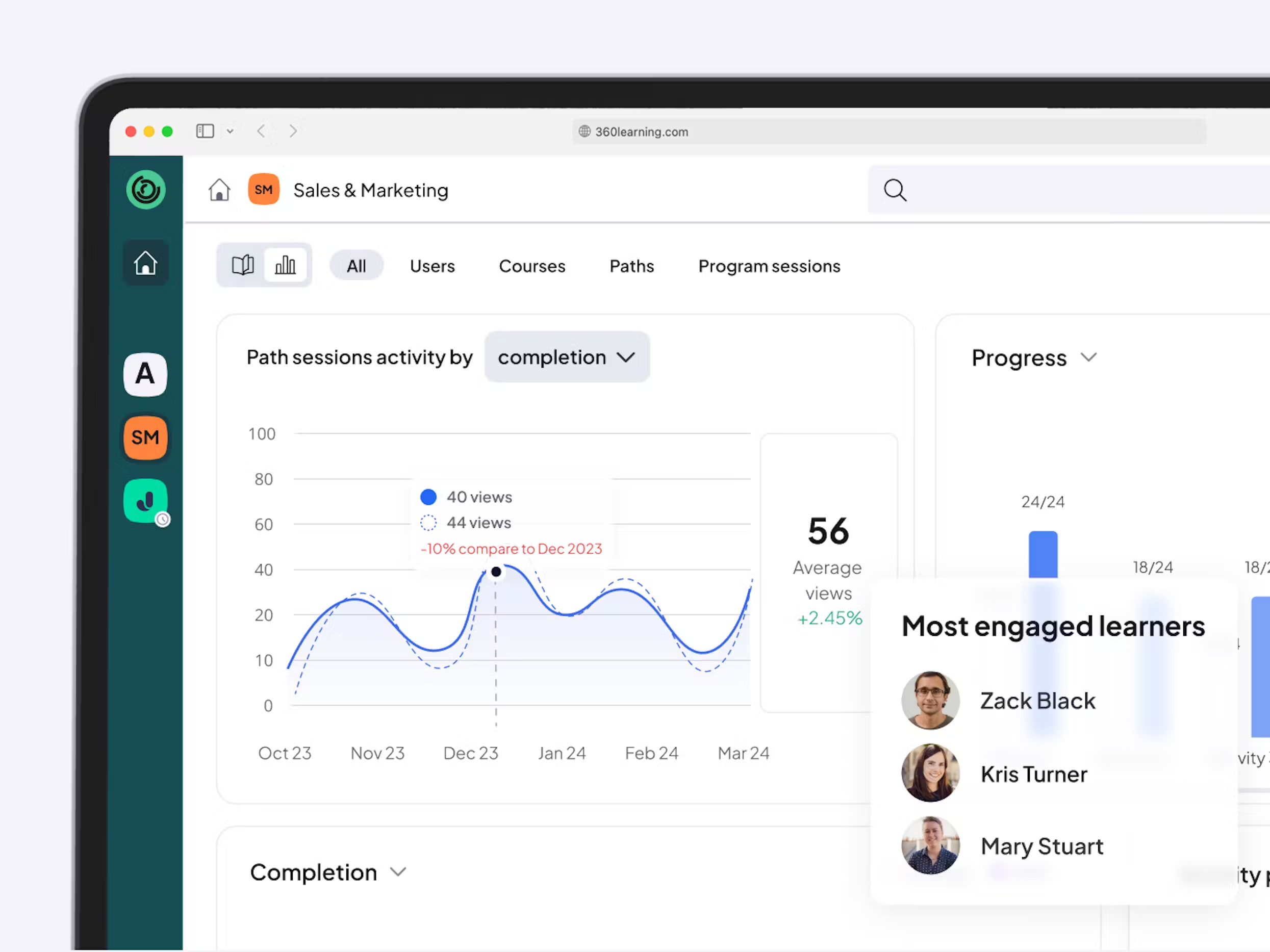
360Learning is a learning platform designed for teams and businesses that want to scale knowledge-sharing across departments, clients, and partners. Unlike traditional course platforms, 360Learning emphasizes peer-driven learning—making it one of the top online course platforms for companies focused on continuous upskilling and internal training.
Best for
360Learning is best suited for mid-sized to large businesses, HR and L&D teams, and enterprises that prioritize team training and employee development.
360Learning pricing
360Learning offers two plans:
A free trial is available for the Team Plan.
*Pricing information retrieved from 360Learning’s website in August 2025.
360Learning support
Support varies by plan. Team Plan users get access to documentation and standard customer service. Business Plan users receive dedicated technical support, implementation assistance, and personalized onboarding. The platform also provides extensive resources like learning templates and best practices for content creators and admins.
Pros & cons
Pros
- Strong collaborative learning and feedback features
- Transparent pricing for smaller teams
- Scales well for corporate use
- Supports multiple learning formats and course types
Cons
- Requires internal resources for successful setup
- Less focused on individual creators or solopreneurs
- Custom branding and integrations are reserved for enterprise plans
- Advanced features are limited to higher tiers
Platform #15: Blackboard
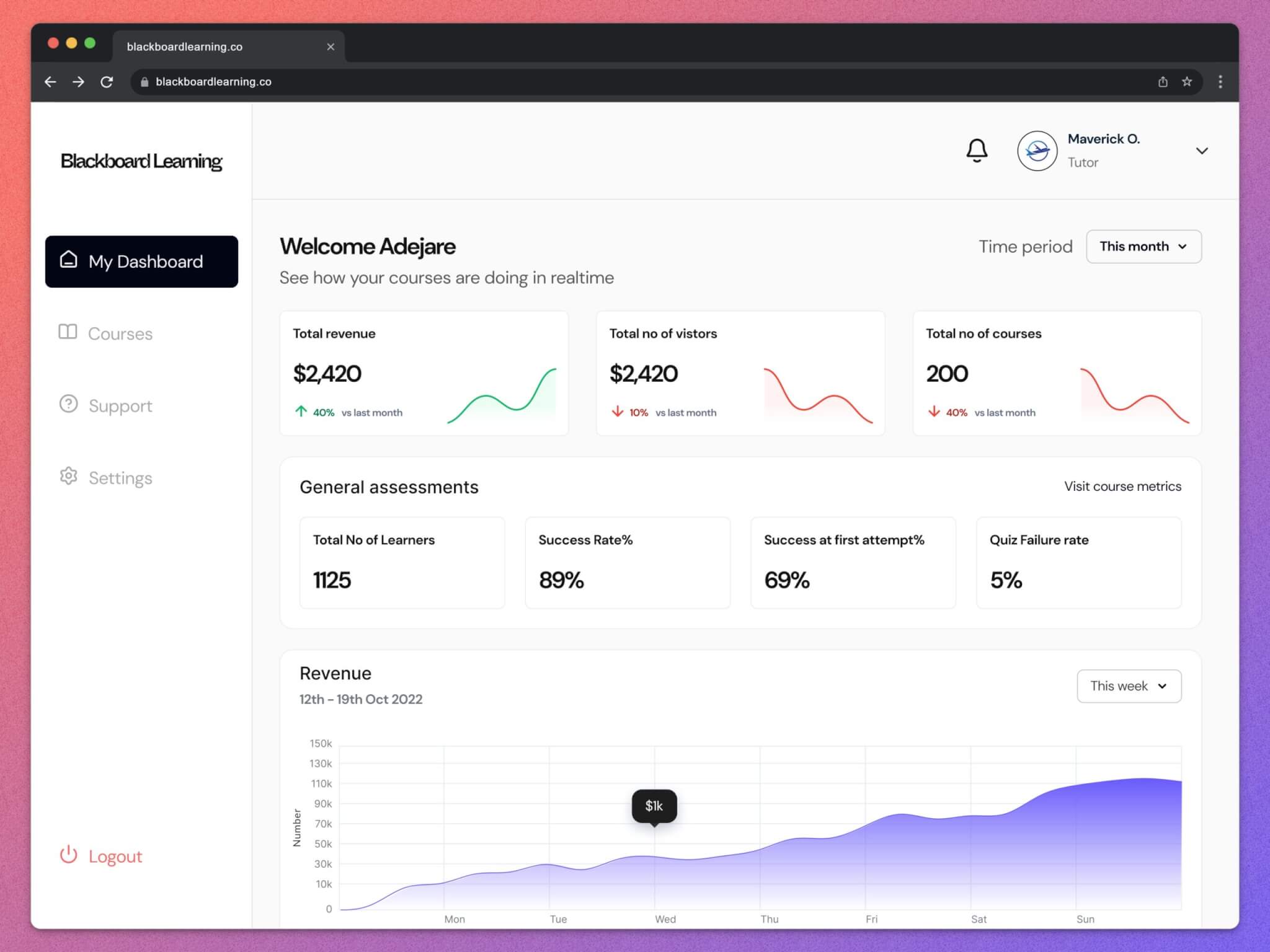
Known for its flexibility and depth, Blackboard supports both synchronous and asynchronous learning, making it one of the top online course platforms for universities, colleges, and organizations with complex educational needs.
Best for
Blackboard is best for universities, K-12 education, and enterprise organizations that need a secure, standards-compliant online class platform with advanced administrative capabilities.
Blackboard pricing
Blackboard pricing is available upon request. A 30-day free trial is available for interested users to explore the platform’s capabilities before committing.
Blackboard support
Blackboard offers tiered customer support with options for 24/7 technical assistance, onboarding services, and a dedicated support portal. Their help center includes searchable knowledge bases, community forums, and live training sessions. Institutions with enterprise plans often receive personalized onboarding and dedicated account managers.
Pros & cons
Pros
- Trusted by academic institutions globally
- Advanced features for grading, compliance, and learning paths
- Integrates with SIS, Zoom, and accessibility tools
- Scalable for thousands of users
Cons
- Not ideal for solo creators or small businesses
- The interface can feel outdated compared to modern platforms
- Setup and maintenance may require IT support
Platform #16: iSpring Learn
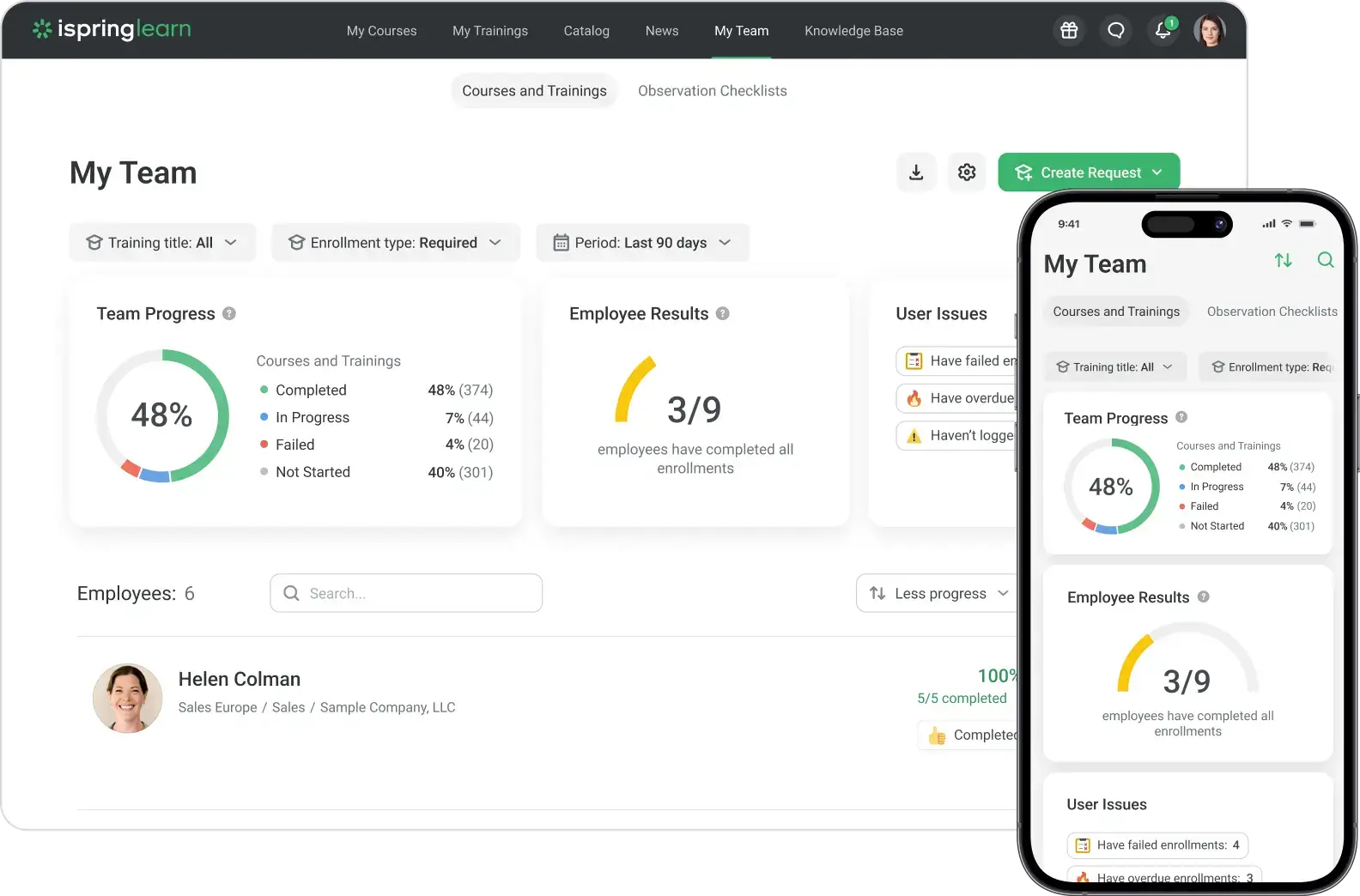
iSpring Learn is a cloud-based LMS designed to simplify corporate training and employee onboarding. It combines ease of use with powerful features like interactive content support, learning paths, and real-time tracking.
Known for its intuitive interface and compatibility with SCORM, xAPI, and iSpring Suite authoring tools, it’s one of the best online course platforms for businesses aiming to scale structured training programs.
Best for
iSpring Learn is best for SMBs and mid-sized companies that want a flexible elearning solution with minimal setup. It’s a strong fit for HR and L&D departments focused on employee development, sales training, or product knowledge distribution.
iSpringLearn pricing
iSpring Learn offers a straightforward pricing model with volume-based plans and a free trial:
Both plans include access to training and content management tools.
*Pricing information retrieved from iSpringLearn’s website in December 2025
iSpringLearn support
iSpring Learn includes responsive support via email, live chat, and phone. Users get access to a detailed knowledge base, onboarding webinars, and one-on-one demos.
Pros & cons
Pros
- Easy to implement with minimal training
- Fully SCORM- and xAPI-compliant
- Offers detailed learner tracking and analytics
- Integrates with iSpring Suite for rapid content development
Cons
- Not built for solo creators or course sellers
Which online course platform will you choose? And why LearnWorlds is the ideal choice
As you can see, there are many course creation platforms. The real quest, though, is to find the best online course platform or LMS provider that perfectly matches your instructional and business needs.
To build a successful online course business and start teaching your learners new skills, you need to do thorough research on your options and take those platform reviews into consideration. Our tip is: don’t settle until you are happy with what you get.
LearnWorlds stands out for its unique combination of flexibility and depth. You can build highly interactive course content with tools like interactive video, assessments, and drip scheduling—while also managing branding, monetization, and learner analytics in one platform.
Get your free 30-day trial with LearnWorlds today and see what it has to offer.
Rosemary is LearnWorlds’ Content Marketing Manager. She has over 2 decades of experience in omnichannel marketing and content writing for the IT and SaaS industry. Her expertise lies in crafting effective content marketing strategies that attract, engage, and nurture customers, enabling LearnWorlds to reach its target audiences with precision.
Kyriaki is the SEO Content Manager at LearnWorlds, where she writes and edits content about marketing and e-learning, helping course creators build, market, and sell successful online courses. With a degree in Career Guidance and a solid background in education management and career development, she combines strategic insight with a passion for lifelong learning. Outside of work, she enjoys expressing her creativity through music.
FAQ
Everything you have ever wondered, but were too afraid to ask...
LearnWorlds is the most comprehensive online course platform that a beginner or experienced course creator can choose to create and sell online courses. It offers:
If you're looking for an online course platform for students, LearnWorlds is a great option as a cloud-based elearning solution. Other popular options include Udemy, Teachable, Thinkific, and Kajabi.
Consider your specific needs, budget, and goals when searching for a platform. Each platform has its strengths and weaknesses, so make sure to compare their features, ease of use, pricing, and support before making a decision.
Using an online course platform offers instructors greater accessibility, enabling them to reach a diverse global audience. It is also cost-effective in contrast to traditional classroom-based learning and offers several customization options in terms of branding, messaging, course structure, assessment tools, and even SEO.
A course software equipped with interactive multimedia elements and analytics tools creates an enriched learning experience that promotes engagement, retention, and student success.
LearnWorlds is the best all-in-one platform for online courses. While other platforms like Kajabi, Thinkific, and Teachable also offer useful features, LearnWorlds focuses on interactive and engaging course creation, making it the top choice for online courses.
LearnWorlds offers a Mobile app Builder, an Assessment Builder, a no-code Website Builder, an AI Course Creator, white labeling, advanced analytics, and excellent customer support.
The best platform for selling online courses should offer robust ecommerce features like flexible pricing, subscriptions, bundles, upsells, and integrated checkout and payment gateways.
High-quality online education platforms such as LearnWorlds, Kajabi, and Thinkific stand out for their built-in tools that help creators market and sell courses directly through branded online course websites. These platforms also support custom checkout flows, sales pages, and analytics to optimize your revenue strategy.






